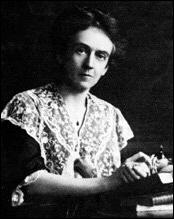Great art is the expression of a solution of the conflict between the demands of the world without and that within.

"Edith Hamilton" was a German-American educator and author who was "recognized as the greatest woman Classicist". She was sixty-two years old when The Greek Way, her first book, was published in 1930. It was instantly successful, and is the earliest expression of her belief in "the calm lucidity of the Greek mind" and "that the great thinkers of Athens were unsurpassed in their mastery of truth and enlightenment".
In 1957, when the Book-of-the-Month Club selected The Greek Way (1930) as a featured book, it enhanced her efforts at directing the American mind towards Ancient Greece, despite it having been published twenty-seven years earlier. Moreover, by then, she already had published other books, among them The Roman Way (1932), Mythology (book)/Mythology (1942), and The Echo of Greece (1957); to date, at the high school and university levels, Mythology remains the premier introductory text about its subject. The New York Times has described her as the Classical Scholar who "brought into clear and brilliant focus the Golden Age of Greek life and thought ... with Homeric power and simplicity in her style of writing".
If you enjoy these quotes, be sure to check out other famous writers! More Edith Hamilton on Wikipedia.When the freedom they wished for most was freedom from responsibility, then Athens ceased to be free and was never free again.
A people's literature is the great textbook for real knowledge of them. The writings of the day show the quality of the people as no historical reconstruction can.
Civilization...is a matter of imponderables, of delight in the thins of the mind, of love of beauty, of honor, grace, courtesy, delicate feeling. Where imponderables, are things of first importance, there is the height of civilization, and, if at the same time, the power of art exists unimpaired, human life has reached a level seldom attained and very seldom surpassed.
There are few efforts more conducive to humility than that of the translator trying to communicate an incommunicable beauty. Yet, unless we do try, something unique and never surpassed will cease to exist except in the libraries of a few inquisitive book lovers.
To be able to be caught up into the world of thought-that is educated.
Theories that go counter to the facts of human nature are foredoomed.
None but a poet can write a tragedy. For tragedy is nothing less than pain transmuted into exaltation by the alchemy of poetry.
Copyright © 2024 Electric Goat Media. All Rights Reserved.